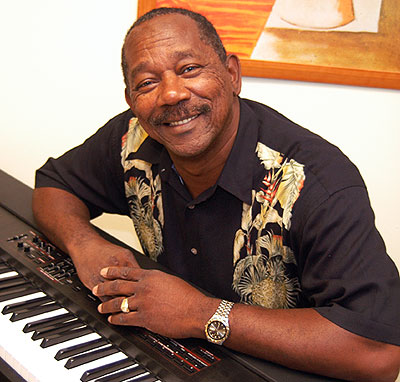| Professor
of Afro-Ethnic Studies Will Teach in Poland As a Fulbright Scholar |
|||||
|
|||||
| Professor Stan Breckenridge finds
affinity with Polish students in his love of African-American music
By Valerie Orleans Whether it’s spirituals, gospel, ragtime or hip hop, Stan Breckenridge is interested. The lecturer in Afro-Ethnic studies has examined African-American musicology since his college days, sharing his interest and enthusiasm with Southland students for years. Beginning in September, he will share his expertise with students at Marie Curie Sklodowska University during a semester as a Fulbright Scholar in southeast Poland. Among the courses he will teach are “History of Rock,” “African-American Music Appreciation” and “African-Americans in the Performing Arts.” Breckenridge was drawn to Poland following a trip there a year ago. A colleague, Michael Steiner, professor in American studies, was teaching in Poland on a Fulbright and Breckenridge visited one of his classes (see Fullerton Fulbright Duo). “The Polish students were quite interested in African-American music,” he recalled. “It was quite amazing. I found some of the Polish students were more attuned to African-American music than their American counterparts. “That may be because Poles, like Africans, have a history of discrimination and persecution,” he added. “I find that Poles and Irish citizens understand what it is like to be offered jobs that nobody else wants,” said Breckenridge. “In World War II, the Poles were persecuted, and I think this allows them a certain affinity for the situations where African-Americans also find discrimination. “In fact, hip hop is huge in Poland and they embrace the black culture. For me, it’s a wonderful affirmation to be recognized by another culture.” How does Breckenridge define black music? “I think of it as a vehicle for communicating,” he said. “It was, and is, used as a way to express emotions and divert attention from hardship. “You have gospel, spirituals, ragtime — listen to the melody and texture and harmony — then look at its influence on other musical styles. In some ways, music is like food — if you understand it, it provides great insight into another culture.” Breckenridge’s love of music began at an early age. In 1969, he was selected as a “Super Pepsi Battle of the Bands” winner. At the time, the designation was similar to today’s “American Idol” television show, says the musicologist, who made appearances with such luminaries as Bill Cosby, Rowan and Martin, and Nancy Sinatra during the 1970s. “Our group, the Sematics, was heavily influenced by Motown,” he said. “We modeled ourselves after the Temptations. After we won the Battle of the Bands, we performed in numerous venues, including the Greek Theatre in Los Angeles. The group received a recording contract and a car. “The seventies were an interesting time in history,” Breckenridge said. “There were significant changes in how people dealt with those of different genders, ethnicities and cultures. I feel like I had a front-row seat as these changes were taking place.” While Breckenridge grew up in a household filled with music — he remembers everyone in his family walking around singing hymns — the exposure to many new people and groups, as well as new forms of music, prompted him to change from an emphasis in choral conducting to musicology and ethnomusicology. He received his bachelor’s degree at Cal State Fullerton and his master’s and doctorate from Claremont Graduate University. “Being a part of a singing group made me realize I could do anything,” he said. “It inspired me to learn more about music and devote more study to it.” In addition to his teaching, Breckenridge has published two editions of “African American Music for Everyone,” and is working on a new book, “Popular Music in America,” that is scheduled for a fall release. Now, in his role as teacher, both here and abroad, Breckenridge hopes to use music as a vehicle to communicate about different cultures. “Music is lyrical poetry,” he explained. “I look at the music and ask, ‘How does the sound support what is stated?’” With his Fulbright, Breckenridge wants to introduce a new group of students to the African-American culture and to continue to challenge assumptions that people often make. “I am really looking forward to this opportunity,” he said. “I hope to learn as much from my students and the Polish people as they learn from me.” |
|
